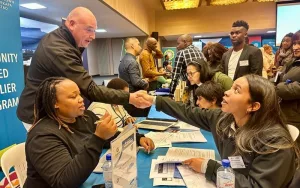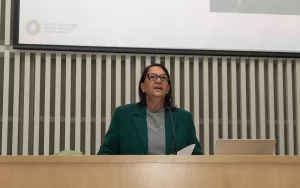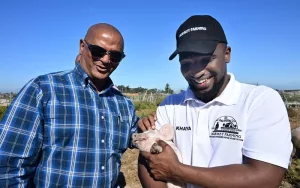Major changes are coming to the M3 route in Newlands, Cape Town, to ease traffic congestion and improve urban mobility. The enhancements will involve closing certain intersections and establishing median terminations, alongside new rightturn and freeflow lanes. These changes are set to begin in early 2026, and are expected to improve daily commutes and make them safer for commuters. The City of Cape Town is committed to enhancing urban mobility, and these changes signal a new era of streamlined commuting in the city.
The South African Revenue Service (SARS) is making changes to the ecommerce landscape to promote fair competition. Two highprofile Far East businesses, Shein and Temu, have been leveraging the ecommerce atmosphere in South Africa, but SARS’s new policy will overhaul how Customs and Excise handle smallscale orders, which will dramatically influence the pricing structure of these digital storefronts. The change is a counteraction to charges from indigenous South African businesses who allege that Shein and Temu have been manipulating the former law to gain a pricing edge over local retailers.
Cape Town is supporting the growth of small and micro businesses with a unique event called the Supplier Matchup Session. This event, part of the Smart Supplier Programme, offers a platform for SMMEs to connect with industry leaders, network, and enhance market penetration. The city is committed to empowering budding entrepreneurs with the tools and support necessary for success, and this initiative continues to help Cape Town become a businessfriendly city. The event attracted 300 SMMEs and significant businesses from various sectors, and participants shared their success stories, highlighting the transformative potential of the programme.
The Amy Foundation and Lagoon Beach Hotel in South Africa have teamed up to combat the country’s alarming youth unemployment rate of 45.5%. The partnership provides practical experience and skill enhancement opportunities to young adults interested in pursuing careers in the hospitality industry. Already, 127 individuals have benefited from the programme, with 47 securing contracts and seasonal positions. The collaboration serves as an inspiring model for how targeted initiatives and strong partnerships can lead to sustainable solutions to pressing societal problems.
Cape Town’s libraries are hosting career fairs that provide high school students with a diverse range of career options. The fairs offer a chance for learners to interact with industry professionals and gain deep insights into various professions. The initiative has been very successful, with over 2,000 attendees in just a few months. The fairs are redefining the role of libraries in modern society by turning them into dynamic arenas for career introspection and guidance.
Cape Town recently held the Energy Water Waste Forum, which brought together city authorities and industry experts to find solutions to energy challenges while balancing economic expansion. The city has set ambitious goals to become carbonneutral and climateresilient by 2050, with a focus on enhancing energy efficiency. The forum was a strategic collaboration and marks a significant step towards a more sustainable and economically prosperous future for Cape Town.
Cape Town is a great place for job seekers, with countless fulltime job opportunities and a commitment to human capital development. The city’s recruitment process is designed to ensure fairness and healthy competition, selecting the most deserving and qualified candidates. Cape Town’s workforce is a perfect blend of talent and diversity, contributing unique experiences, skills, and viewpoints. The city is dedicated to nurturing its employees by providing them with opportunities for training and learning, creating a nurturing environment that promotes talent, encourages growth, and shapes a promising future. Cape Town’s transformation into an employment hub serves as a model for cities around the globe.
FYN restaurant in Cape Town is a toprated eatery that combines Japanese and South African culinary traditions to create a unique dining experience. Chef Peter Tempelhoff and his team have earned multiple awards and recognition, including a spot on The World’s 50 Best Restaurants list. FYN’s commitment to sustainability and collaboration with local providers and producers make it more than just a restaurant, but a testament to South Africa’s flourishing food culture.
Four ecoinnovation pioneers stand out at Bay Harbour Market in South Africa, showcasing profitable and sustainable models for operations. They address issues such as textile waste, carbon footprint, and plastic pollution while empowering local communities and promoting creative thinking towards a greener tomorrow. These green pioneers prove that sustainability is a feasible and profitable avenue that fosters community, creativity, and care for the environment.
Eskom, the largest power utility in South Africa, has achieved an unprecedented 65day suspension of load shedding, signaling a significant improvement in power reliability. This has resulted from Eskom’s strategic efforts to bolster the dependability of its power generation fleet and streamline maintenance, as outlined in its Generation Operational Recovery Plan. Key performance indicators such as the Unplanned Capacity Loss Factor and Sustained Energy Availability Factor demonstrate Eskom’s progress towards greater reliability. Despite these achievements, Eskom urges the public to continue using electricity judiciously, promoting a reliable energy future for South Africa.
Soul Barrel Brewing is a shining star among African breweries, having won the title of Africa’s finest beer producer for two consecutive years. Their awardwinning ‘Ale of Origin’ is a threeyearaged fermented ale crafted with indigenous South African grains and Lambic methods of spontaneous fermentation, resulting in a complex flavor profile with hints of zesty mango, orange, wild fruit, tart lemon acidity, yeast biscuit earthiness, honey, and floral undertones. The success of the Ale of Origin is a tribute to South African agriculture and the potential of local produce, showcasing the future of South Africa’s beer industry.
Cape Town: A Symbol of Hope with Unprecedented Infrastructure Investment for Alleviating Poverty
Cape Town has proposed a R39.5 billion infrastructure investment blueprint, known as the Building for Jobs Budget, over three years to alleviate poverty and become Africa’s most businessfriendly city. The budget includes plans for diverse projects, including upgrading informal settlements, providing lowincome households with the highest free water allocation, and offering the widest qualifying criteria for a 100% rates rebate. The budget is a testament to the city’s commitment to democracy, with extensive comments and feedback from Capetonians contributing to its formation. The Building for Jobs Budget serves as a symbol of hope, reflecting the city’s determination to create a prosperous future for all.
Cape Town’s Building for Jobs Budget 2024/25 is a cuttingedge fiscal plan aimed at benefiting lowerincome demographics, committing 75% of total expenditure to them. It aims to create 130,000 constructionrelated jobs in the next three years and includes propoor infrastructure spending of R9 billion, outshining any other city. The budget also prioritizes investments in Cape Town’s most rapidly expanding and deprived areas, leading the way in free basic services and property rates, and is a testament to Cape Town’s commitment to its citizens, envisioning a brighter, more inclusive future.
Cape Town’s Urban Mobility Directorate Plans to Revitalize Bellville Central Business District
The proposed road schemes aim to strategically rearrange Bellville’s transport routes to enhance urban mobility, bolster roadbased freight and public transport services, and ultimately, boost the region’s economic development. The Cape Town Urban Mobility Directorate has a plan to revitalize the Bellville Central Business District through significant road enhancements and extensions. The public is welcome to provide their comments and thoughts on the proposed schemes, and the deadline for comments is 14th June 2024. The initiative promises a brighter, more accessible future for Bellville CBD.
The success of AgriKey Farming highlights the critical role of entrepreneurship training in catalyzing economic development and the transformative potential of connecting entrepreneurs with educational resources and support. AgriKey Farming in Mfuleni, South Africa started as a small chicken farming business but expanded into pig farming, crop cultivation, and vertical farming systems on school grounds to reinforce school feeding programs and create job opportunities. The owner, Khaya Burwana, also established five meat stands, providing fresh, locallyproduced meat products and creating job opportunities.
South African businesses and brands are offering a variety of incentives like free gourmet treats, discounts and deals, and even discounted Uber rides to encourage citizens to participate in the general elections and exercise their right to vote. The hospitality industry is also joining in, with Southern Sun offering a 20% discount for those planning a vacation around the election period. This innovative approach to promoting voter participation not only encourages citizens to engage in democracy but also supports local businesses, fostering a strong sense of community and shared responsibility.
















